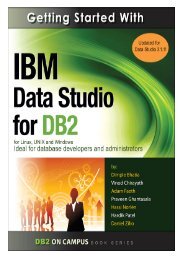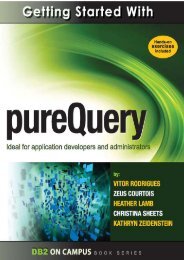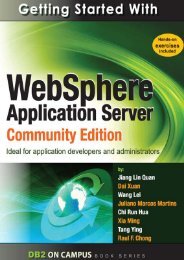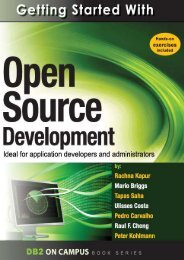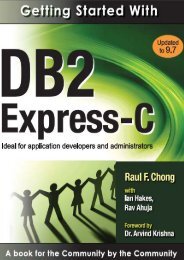Managing Computers in Large Organizations
Create successful ePaper yourself
Turn your PDF publications into a flip-book with our unique Google optimized e-Paper software.
<strong>Manag<strong>in</strong>g</strong> Microcomputers <strong>in</strong> <strong>Large</strong> <strong>Organizations</strong><br />
http://www.nap.edu/catalog/167.html<br />
About this PDF file: This new digital representation of the orig<strong>in</strong>al work has been recomposed from XML files created from the orig<strong>in</strong>al paper book, not from the<br />
orig<strong>in</strong>al typesett<strong>in</strong>g files. Page breaks are true to the orig<strong>in</strong>al; l<strong>in</strong>e lengths, word breaks, head<strong>in</strong>g styles, and other typesett<strong>in</strong>g-specific formatt<strong>in</strong>g, however, cannot be<br />
reta<strong>in</strong>ed, and some typographic errors may have been accidentally <strong>in</strong>serted. Please use the pr<strong>in</strong>t version of this publication as the authoritative version for attribution.<br />
A PERSPECTIVE FOR THE CHIEF EXECUTIVE OFFICER 75<br />
The MIS activities of most companies today are <strong>in</strong> the third stage, marked<br />
by central controls. However, the growth of personal comput<strong>in</strong>g and end-user<br />
experience is generally back <strong>in</strong> stage one, <strong>in</strong>itiation, or enter<strong>in</strong>g stage two,<br />
contagion. We are still <strong>in</strong> the process of learn<strong>in</strong>g what personal comput<strong>in</strong>g is all<br />
about, where the benefits are, and how it is go<strong>in</strong>g to work. At the same time<br />
developments are spurr<strong>in</strong>g rapid <strong>in</strong>creases <strong>in</strong> use.<br />
This disparity of stages is a source of concern about the growth of personal<br />
comput<strong>in</strong>g. A major concern <strong>in</strong> stages one and two, <strong>in</strong>itiation and contagion,<br />
lies <strong>in</strong> the unpredictability of end-user development projects. Without adequate<br />
controls <strong>in</strong> place there are risks that systems will not achieve expected benefits<br />
and will not be developed on time and with<strong>in</strong> budget. There are risks that<br />
<strong>in</strong>flexible systems may result. Without proper development techniques for<br />
personal computers the systems developed by end users will be difficult to<br />
understand, difficult for others to modify, and unresponsive to chang<strong>in</strong>g<br />
bus<strong>in</strong>ess needs.<br />
In the traditional MIS environment these risks were addressed <strong>in</strong> the<br />
control stage by a variety of systems-development discipl<strong>in</strong>es and review<br />
procedures. Well-def<strong>in</strong>ed programm<strong>in</strong>g guidel<strong>in</strong>es were developed. But no such<br />
roadmaps exist to guide users today <strong>in</strong> develop<strong>in</strong>g applications for personal<br />
computers.<br />
The last set of issues relates to the shift <strong>in</strong> skills required by widespread<br />
use of personal computers. First, users will become developers, a function<br />
formerly <strong>in</strong> the doma<strong>in</strong> of the MIS community. Yet many users today do not<br />
have the skills to manage the development process properly.<br />
Second, end users must learn to manage computers and deal with the risks<br />
<strong>in</strong>volved <strong>in</strong> their use. They will be responsible for backup, data <strong>in</strong>tegrity,<br />
security, and error detection. In the past the MIS organization has taken care of<br />
most of these tasks.<br />
Third, end users must learn to deal with shift<strong>in</strong>g technical trends. You can't<br />
<strong>in</strong>stall new systems every time a new gimmick hits the market, but you don't<br />
want to miss major opportunities because you are locked <strong>in</strong>to obsolete<br />
equipment.<br />
The growth <strong>in</strong> personal computers means a change <strong>in</strong> the roles of MIS<br />
personnel as well. This began with the development of user-friendly languages,<br />
<strong>in</strong>formation centers, and timeshar<strong>in</strong>g and has accelerated with the use of<br />
personal computers. Many MIS professionals who have spent their careers as<br />
developers will move to user departments; others will become consultants or<br />
Copyright © National Academy of Sciences. All rights reserved.




